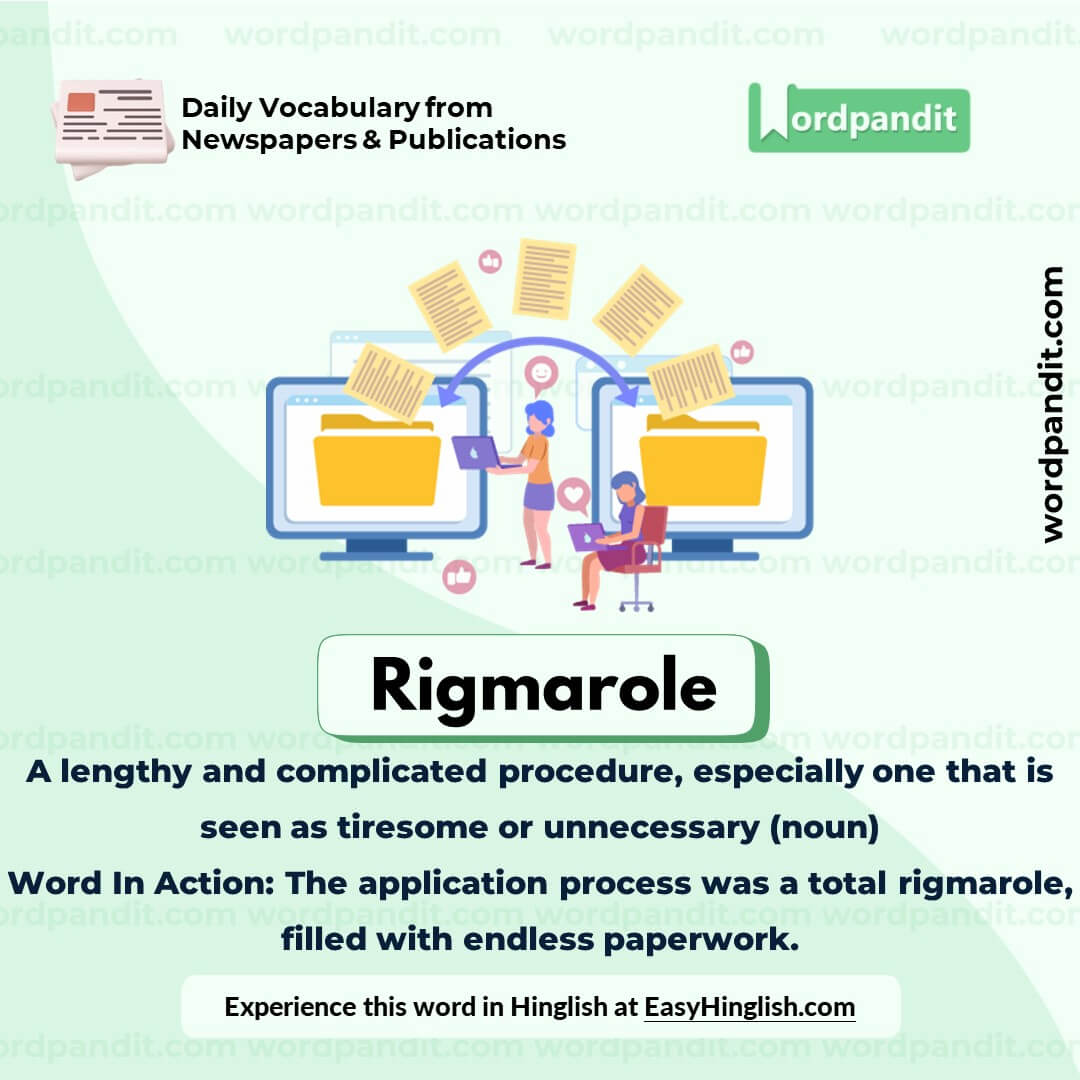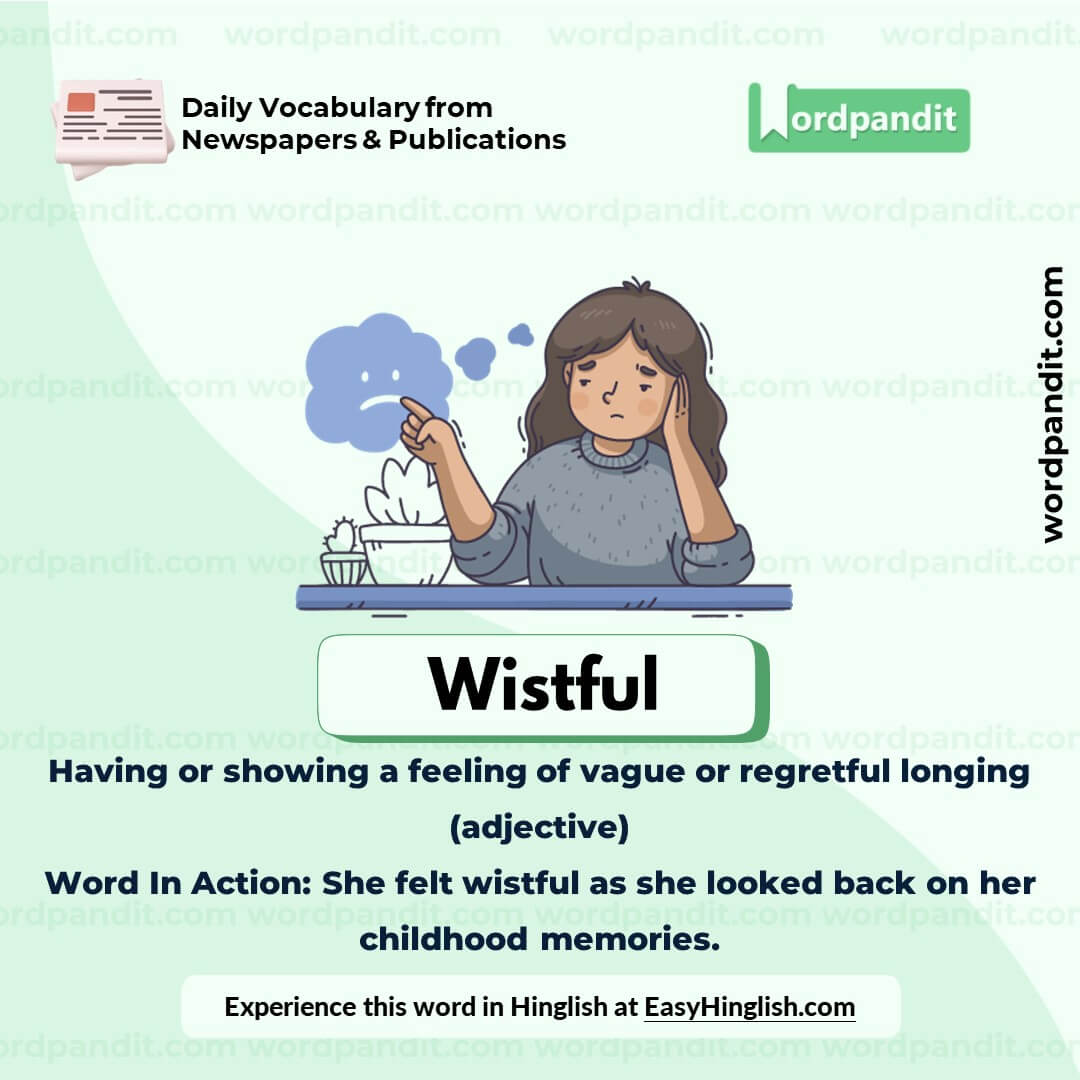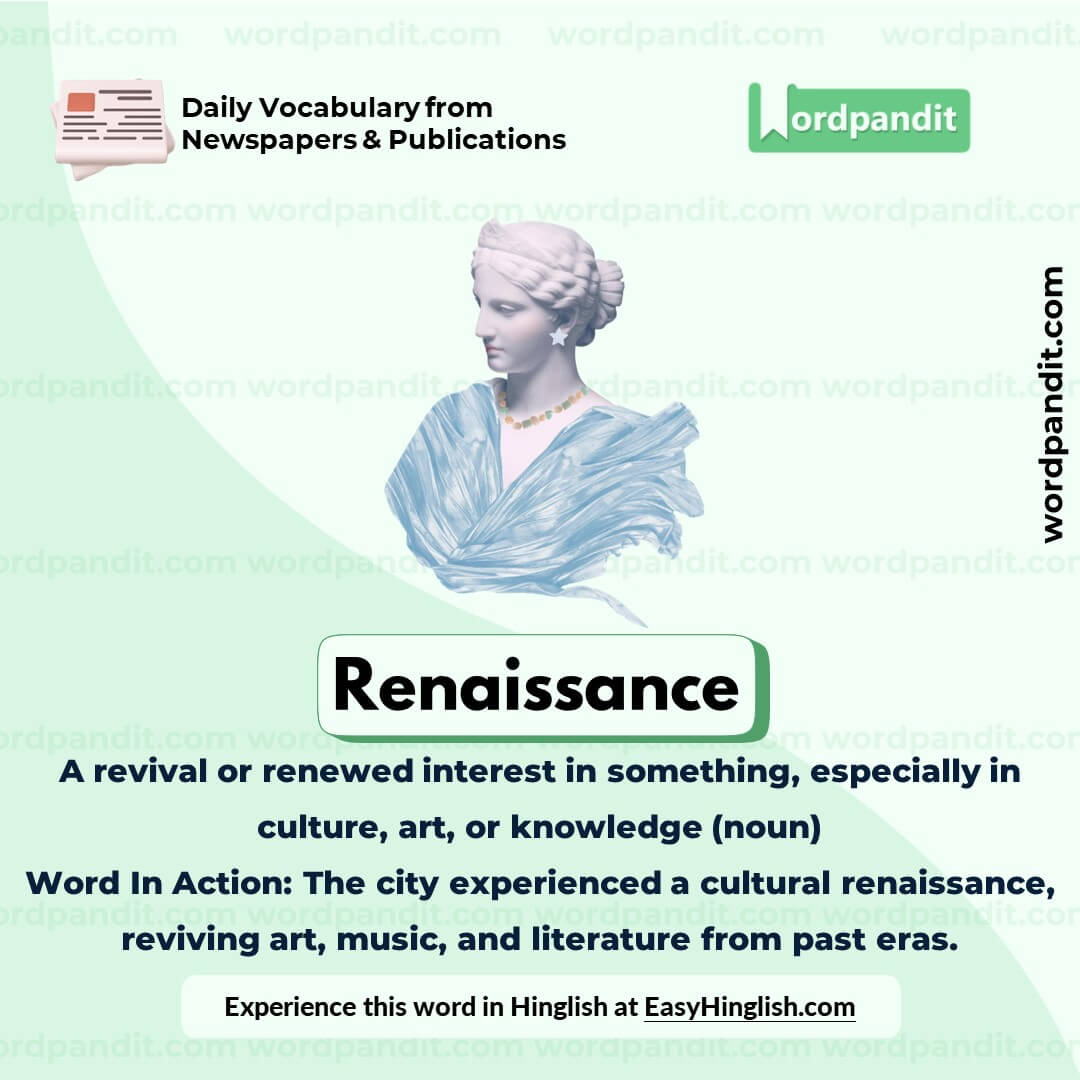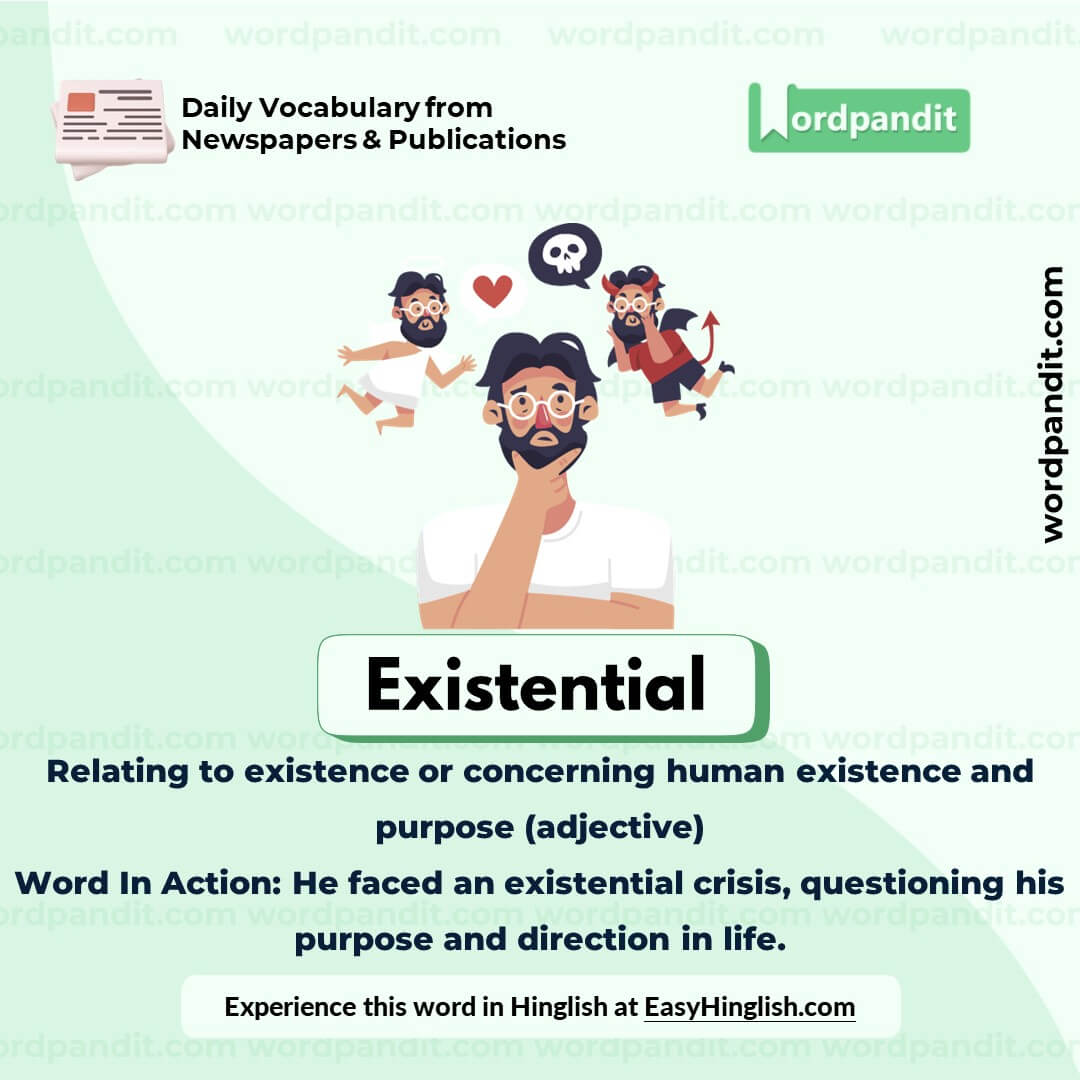Daily Vocabulary from Indian Newspapers and Publications
Welcome to Wordpandit’s Indian Vocabulary Hub
At Wordpandit, we understand the importance of staying rooted in the local context while expanding your language skills. This section focuses on enriching your vocabulary with words and phrases drawn from India’s leading newspapers and publications, ensuring you're learning vocabulary that is practical, relevant, and uniquely Indian.
Why Indian Sources Matter
We believe that the best way to master any language is by immersing yourself in local content. That’s why we carefully curate vocabulary from top Indian publications, including:
- The Hindu
- The Times of India
- The Economic Times
- Hindustan Times
- Live Mint
- The Indian Express
- And many others...
Stay Updated, Stay Relevant
With daily updates from Indian news sources, you’ll be consistently learning words that reflect the trends and shifts in Indian society and culture. Our focus is to provide vocabulary that enhances your understanding of the language in an Indian context.
How Wordpandit Supports Your Goals
Whether you’re preparing for exams, aiming to improve your professional communication, or simply want to stay connected with the latest Indian vocabulary, Wordpandit is here to guide you every step of the way.
Learn with a Practical Approach
Our interactive learning methodology includes real-world examples, engaging activities, and context-specific usage to ensure that every word becomes part of your active vocabulary.
Dive into Indian Vocabulary Today!
Why Choose Wordpandit?
Practical Learning: Focus on words you'll actually encounter in real-world reading, enhancing your comprehension and communication skills.
Diverse Content: From current affairs to scientific breakthroughs, our varied sources expose you to vocabulary across multiple domains.
Effortless Integration: Make Wordpandit a part of your daily routine. Just a few minutes each day can significantly boost your lexicon over time.
Your Path to Vocabulary Mastery
- Visit our Daily Vocabulary section regularly
- Explore new words and their usage in context
- Practice incorporating these words into your own writing and speech
- Track your progress as your vocabulary expands
Start Your Journey Today
Embark on your vocabulary enhancement journey with Wordpandit. By consistently engaging with our daily posts, you'll build a robust vocabulary that serves you well in academic, professional, and personal contexts.
Remember, a word a day keeps linguistic limitations at bay. Make Wordpandit your daily companion in the quest for vocabulary excellence!
WORD-1: Emboldened
Context:
"Ukraine and its Western allies say Putin unleashed an imperial-style war against its smaller neighbour and have repeatedly said that if Russia wins the war then autocratic countries across the world will be emboldened." - Telegraph India
Explanatory Paragraph:
Emboldened refers to the feeling of being made more confident or fearless, often in a way that might lead one to take bold actions. When someone or something is emboldened, it means they feel empowered to act more assertively, often due to a recent success, support, or an absence of opposition.
Meaning: Given the courage or confidence to do something, especially something risky (adjective)
Pronunciation: im-BOHL-duhnd
Difficulty Level: ⭐⭐⭐ (Intermediate)
Etymology: From Old English "embolden" meaning "to make bold"
Synonyms & Antonyms:
Synonyms: encouraged, inspired, motivated, fortified, empowered
Antonyms: discouraged, deterred, intimidated, restrained, daunted
Usage Examples:
- The success of the first project emboldened her to take on more ambitious tasks.
- His friends emboldened him to share his idea with the team, despite his initial hesitation.
- The positive response from the crowd emboldened the speaker to delve into more challenging topics.
- After winning the initial battle, the army felt emboldened to press further into enemy territory.
Cultural Reference:
"Fortune favors the bold." - Latin proverb, often cited to encourage courageous actions.
Think About It:
What situations or experiences in your life have emboldened you to take actions you wouldn't have otherwise considered?
Quick Activity:
Think of a time when someone encouraged you to take a brave step. Write a sentence describing how you felt emboldened by their support.
Memory Tip:
To remember "emboldened," think of it as "enabled to be bold"—it captures the meaning of gaining confidence to act.
Real-World Application:
In leadership and public speaking, people who feel emboldened are more likely to take risks, advocate for change, and challenge the status quo.
WORD-2: Rigmarole
Context:
"Thus began a rigmarole that saw me shuttling between school, corporation, hospital and advocate. I was like a baseball player, running between bases, trying hard to retain my place." - The Wire
Explanatory Paragraph:
The word rigmarole describes a long and complicated series of actions or steps, often seen as unnecessarily complex. When someone says they went through a "rigmarole," it usually means they had to deal with a confusing, frustrating, or repetitive process.
Meaning: A lengthy and complicated procedure, especially one that is seen as tiresome or unnecessary (noun)
Pronunciation: RIG-muh-rohl
Difficulty Level: ⭐⭐⭐ (Intermediate)
Etymology: Originated in the 18th century from a medieval word "ragman roll," a lengthy list or catalog
Synonyms & Antonyms:
Synonyms: hassle, fuss, ordeal, complexity, complication
Antonyms: simplicity, clarity, ease, straightforwardness
Usage Examples:
- After a long rigmarole with customer service, she finally got her refund.
- Applying for a visa often involves a rigmarole of paperwork and approvals.
- The whole rigmarole of filing taxes each year can be overwhelming for many people.
- He went through a rigmarole to set up his new phone, calling multiple support centers.
Cultural Reference:
"A regular rigmarole," a phrase sometimes used in classic British literature, describes tiresome formalities or red tape, especially in government or bureaucracy.
Think About It:
Why do you think some systems or processes turn into a "rigmarole"? Could it be avoided, or is it sometimes necessary?
Quick Activity:
Describe a time when you had to go through a "rigmarole" to accomplish something. How did you feel during the process?
Memory Tip:
Think of "rigmarole" as "rigid role"—a situation where you're forced into a frustrating series of actions.
Real-World Application:
The term "rigmarole" is often used to describe bureaucratic processes in government or corporate systems where unnecessary steps and paperwork make simple tasks overly complicated.
WORD-3: Wistful
Context:
"Since 2014 a wistful time travel has gradually been woven into our political fibre by our leaders." - The Wire
Explanatory Paragraph:
The word wistful conveys a sense of longing or nostalgia, often mixed with a little sadness. When someone is wistful, they may be thinking about something from the past that they miss or wish could return, reflecting a bittersweet sense of yearning.
Meaning: Having or showing a feeling of vague or regretful longing (adjective)
Pronunciation: WIST-fuhl
Difficulty Level: ⭐⭐ (Intermediate)
Etymology: Originated from the 17th century, possibly from "wist," an old term meaning "intention" or "desire"
Synonyms & Antonyms:
Synonyms: nostalgic, yearning, longing, reflective, pensive
Antonyms: content, satisfied, cheerful, fulfilled, optimistic
Usage Examples:
- She gave a wistful smile as she looked at old photos from her childhood.
- The film’s ending left the audience feeling wistful about simpler times.
- He often felt wistful when he saw friends heading off on adventures he once enjoyed.
- As autumn arrived, she felt a wistful longing for the carefree days of summer.
Cultural Reference:
The classic novel "The Great Gatsby" by F. Scott Fitzgerald explores themes of wistfulness, with Gatsby longing for a past romance and idealized version of life.
Think About It:
What kinds of memories or experiences make you feel wistful? Do you think it's helpful or harmful to dwell on the past?
Quick Activity:
Write about a place or time that you feel wistful about. What emotions come up when you think of it?
Memory Tip:
Think of "wistful" as "wishful"—someone who is wistful might be wishing for something from the past.
Real-World Application:
The term "wistful" is often used in literature and art to capture the feeling of looking back on the past with a mix of happiness and regret, common in reflective pieces or nostalgic stories.
WORD-4: Renaissance
Context:
"Notable figures such as Raja Ram Mohan Roy, the father of the Indian Renaissance, Rajendra Prasad, India’s first President, and the renowned writer Munshi Premchand are historically believed to have gained their foundational knowledge from madrasas and their teachers, known as maulvis." - The Hindu
Explanatory Paragraph:
Renaissance refers to a period of significant cultural, intellectual, and artistic revival or rebirth. Originally associated with the flourishing of art, science, and humanism in Europe between the 14th and 17th centuries, the term can also describe any era or movement marked by renewed interest in learning, innovation, and enlightenment, such as the Indian Renaissance led by social reformers like Raja Ram Mohan Roy.
Meaning: A revival or renewed interest in something, especially in culture, art, or knowledge (noun)
Pronunciation: REN-uh-sahns
Difficulty Level: ⭐⭐⭐ (Intermediate)
Etymology: From French renaissance, meaning "rebirth," derived from Latin renasci (to be born again)
Synonyms & Antonyms:
Synonyms: revival, resurgence, rebirth, rejuvenation, renewal
Antonyms: decline, decay, stagnation, regression
Usage Examples:
- The late 20th century saw a renaissance in urban art and street culture.
- The cultural programs initiated by the government sparked a renaissance of traditional music.
- The technology sector experienced a renaissance with the rise of the internet.
- She was considered a "Renaissance woman" for her skills in multiple fields, from science to art.
Cultural Reference:
The term "Renaissance" is often used to refer to the European Renaissance, which saw remarkable advancements in art, science, and philosophy, led by figures such as Leonardo da Vinci, Michelangelo, and Galileo.
Think About It:
What do you think causes a renaissance in a society? How do social, cultural, and political factors contribute to a period of renewal?
Quick Activity:
Identify a period in history, or in your community, where there was a cultural or intellectual renaissance. What sparked this revival?
Memory Tip:
To remember "renaissance," think of it as a "rebirth" or "re-awakening" in art and knowledge.
Real-World Application:
In modern times, "renaissance" can describe a resurgence of interest in anything from local crafts to digital innovation, signifying a renewed focus on creativity and improvement.
WORD-5: Existential
Context:
"When it comes to questions of an existential kind, there is a temptation to engage with the debate." - The Wire
Explanatory Paragraph:
The word existential relates to existence, often involving questions about the purpose and meaning of life. In philosophy, "existential" refers to ideas that explore human freedom, choice, and the experience of being. Existential questions usually address deep topics like identity, mortality, and what it means to live a meaningful life.
Meaning: Relating to existence or concerning human existence and purpose (adjective)
Pronunciation: ek-si-STEN-shuhl
Difficulty Level: ⭐⭐⭐⭐ (Advanced)
Etymology: From Latin existentia meaning "existence," and popularized by 20th-century existentialist philosophy
Synonyms & Antonyms:
Synonyms: philosophical, metaphysical, profound, essential
Antonyms: trivial, superficial, insignificant, minor
Usage Examples:
- The novel explores existential themes such as the search for identity and purpose.
- Climate change presents an existential threat to many species, including humans.
- During the long journey, he began to have existential thoughts about his purpose in life.
- The philosopher’s works often focus on existential questions of human freedom and choice.
Cultural Reference:
Existentialist philosophers like Jean-Paul Sartre and Albert Camus explored existential questions, focusing on human freedom, purpose, and the absurdity of life.
Think About It:
Have you ever questioned your purpose or wondered about the meaning of life? How do you respond to these existential thoughts?
Quick Activity:
Write down a question you have about life that feels "existential." Reflect on why this question is important to you.
Memory Tip:
Think of "existential" as "essential to existence"—something that deals with life’s most profound questions.
Real-World Application:
The term "existential" is commonly used in discussions about global challenges like climate change or social issues, highlighting the profound impact on human survival and purpose.
















